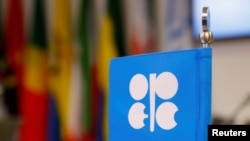OPEC and its oil allies, including Russia and Mexico, agreed Sunday to cut global production by 9.7 million barrels a day starting May 1 to boost world prices that have taken a beating as a result of the coronavirus pandemic.
Ministers from 23 oil producing nations held a virtual emergency meeting and reached a deal just hours before a new week of oil trading begins.
The benchmark price for Brent crude has fallen into the $30-a-barrel range in the past month -- dipping as low as $20 at one point -- severely impacting the budgets of oil-dependent countries.
The Organization of the Petroleum Exporting Countries, led by Saudi Arabia, and other major producers, chiefly Russia, agreed Thursday to the production cut – about 10% of the world oil supply – but Mexico balked at the amount it was being asked to cut, which held up a final agreement.
Under the agreement, Mexico will cut its production by 100,000 barrels a day instead of 400,000 as earlier proposed.
Saudi Arabia is the world’s biggest exporter and has the most oil reserves, although the U.S. now produces more oil.
U.S. President Donald Trump, who urged oil producers to cut production, welcomed the deal.
“This will save hundreds of thousands of energy jobs in the United States. I would like to thank and congratulate President Putin of Russia and King Salman of Saudi Arabia. I just spoke to them from the Oval Office. Great deal for all!,” Trump tweeted.
Iranian Oil Minister Bijan Namdar Zanganeh, says results of the production cut will be seen almost immediately.
“We expect that the market will gradually return to a moderate situation and the results will be visible from tomorrow morning when the world markets open. When barrels of crude are physically taken down from the market, what it means to the market and how the market interprets this will be very decisive," he said while pointing out that U.S. sanctions mean Iran, Libya, and Venezuela are exempt from the production cuts.
As the world price fell over the past month, Trump said U.S. motorists would benefit from cheaper gasoline prices, even if coronavirus lockdowns keep many drivers from going anywhere.
But as the price for oil continued its free-fall, Trump adopted a more measured tone, saying the global price had to be stabilized or the U.S. shale oil industry could collapse and thousands of jobs would be eliminated.





